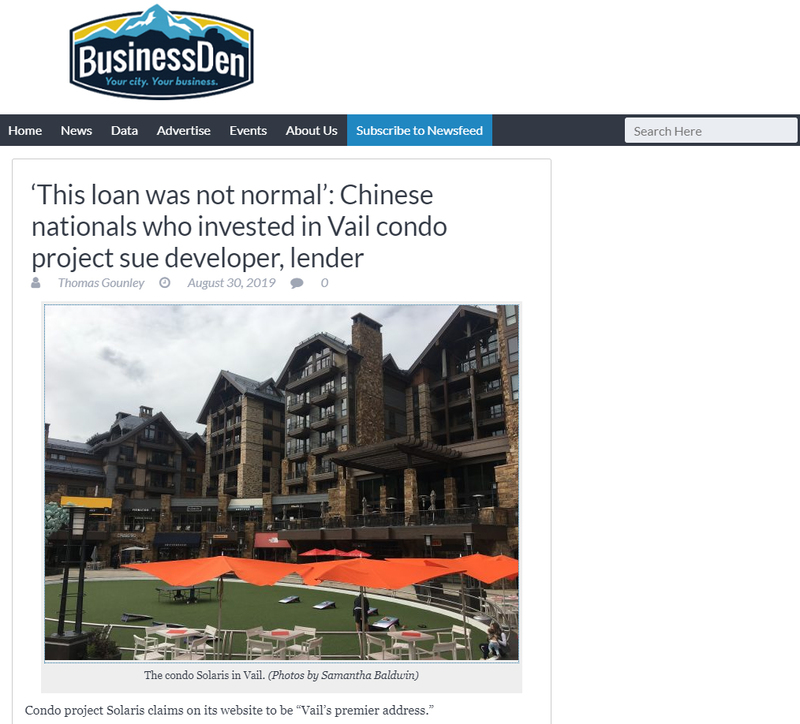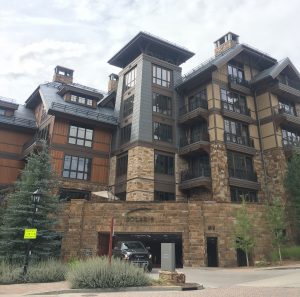‘This loan was not normal’: Chinese nationals who invested in Vail condo project sue developer, lender
The condo Solaris in Vail.
Condo project Solaris claims on its website to be “Vail’s premier address.”
But 13 Chinese nationals who put up millions toward the project see it somewhat differently, saying they invested in “a Roach Motel designed to extract value from foreigners.”
The phrase appears in a lawsuit filed by the individuals Wednesday against Solaris developer Peter Knobel and the entity through which they invested in the project.
The individuals, who received green cards after investing in the project as part of the federal government’s EB-5 Immigrant Investor Program, say they were among 160 foreigners who each invested $500,000 in 2011 and 2012 in Colorado Regional Center Project Solaris LLLP, which then loaned the cumulative $80 million to an entity controlled by Knobel to help build and market The Vail Solaris Residences.
“This Loan was not normal: it was rigged to never get repaid,” the lawsuit reads.
A message left for Knobel with Solaris management staff in Vail was not returned. The Colorado Regional Center also did not respond to a request for comment.
In the lawsuit, filed in federal court in Denver, the 13 individuals say their combined investment “looked like a standard $80 million loan with a 5-year maturity at 5% annual interest, secured by condominium units as collateral.” They expected to receive the amount they invested back with interest.
The lawsuit, however, alleges the loan was “rigged” because it was a nonrecourse loan that was not overcollateralized.
“A typical lender will require $120 million in collateral to secure an $80 million nonrecourse loan, but here the lender let the borrower secure an $80 million loan with only $80 million of collateral, and further allowed the borrower to choose the condominium units supposedly securing this amount, which was only 19 condominiums of the 79 total owned by the borrower, a freakish under collateralization for a non-recourse loan,” the lawsuit reads.
The loan also allowed Knobel to “repay” the $80 million loan with the 19 condos, which he proceeded to do, according to the lawsuit.
“They’re worth probably less than $40 million,” said Chicago-area attorney Douglas Litowitz, who is representing the plaintiffs and specializes in EB-5 fraud cases involving Chinese nationals.
The LLLP — the entity through which the foreigners invested — responded to the situation by offering each investor a “put option” to sell their original investment unit back to the entity “so that when a condominium was sold, the money could be used to pay back the first in line investors who had agreed to exercise the put option, leaving the other investors at the back of the line with no money from the sale,” the lawsuit states.
Slow sales
Only one of the 19 Solaris units has sold in the last three years.
In three years, only one of the 19 units has sold, according to the lawsuit. The lender and Knobel had valued the unit at $3.71 million, but it sold for only $2.78 million. That sale allowed eight of the 160 investors to walk away with, at best, 50 cents on the dollar, the lawsuit says.
Making the situation even “more ridiculous,” in the eyes of the plaintiffs, is the collateral units for sale compete with the remaining units still owned by Knobel, which he is trying to unload.
“Further, Mr. Knobel has a right of first refusal on any unit sold by the LLLP, so if a unit is priced to sell, he can buy it and flip it,” the lawsuit reads. “To put it in simpler terms, the lender cannot or will not get rid of the collateral because it would show their negligence in setting up this deal.”
The lawsuit accuses Knobel and the lender of colluding on the investor-unfriendly terms of the loan.
According to the lawsuit, the plaintiffs were living in China when they invested in the project and relied on brokers to explain legal documents written in English. The lawsuit states that the plaintiffs — some of whom now live in the U.S. after getting green cards — learned only this year that the collateral was not worth enough to cover their investment, after hiring Litowitz.
Litowitz said his clients “are not asking for a windfall,” but just want to be repaid their initial $500,000. He said Knobel made a comment to one of his clients that suggested Knobel believes getting a green card was enough of an investment return.
Litowitz said an attorney in California is preparing to file suit on behalf of some of the other 147 investors.
According to past media reports, in addition to developing in Vail, Knobel is also a partner in the Native Roots dispensary chain, which according to its website has 20 locations in Colorado. He also made headlines as a client of disgraced money manager Bernie Madoff.
Mentions
Litigation Cases
States
- Colorado
Videos





Subscribe for News
Site Digest
Join Professionals on EB5Projects.com →
Securities Disclaimer
This website is for informational purposes only and does not constitute an offer or solicitation to sell shares or securities. Any such offer or solicitation will be made only by means of an investment's confidential Offering Memorandum and in accordance with the terms of all applicable securities and other laws. This website does not constitute or form part of, and should not be construed as, any offer for sale or subscription of, or any invitation to offer to buy or subscribe for, any securities, nor should it or any part of it form the basis of, or be relied on in any connection with, any contract or commitment whatsoever. EB5Projects.com LLC and its affiliates expressly disclaim any and all responsibility for any direct or consequential loss or damage of any kind whatsoever arising directly or indirectly from: (i) reliance on any information contained in the website, (ii) any error, omission or inaccuracy in any such information or (iii) any action resulting therefrom.




